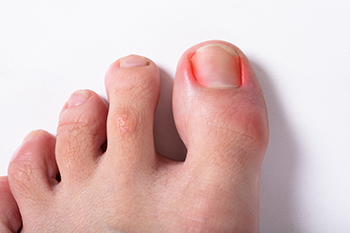6650 Frankford Ave
Philadelphia, PA 19135
 An ingrown toenail occurs when the toenail curls and grows into the skin surrounding the nail. Ingrown toenails usually become painful, red and swollen, and if left untreated, they can become infected. Common situations that cause ingrown toenails include wearing tight fitting shoes, improperly cutting the toenails, having sweaty feet, or sustaining a toe injury. If you are struggling with an ingrown toenail, soaking the feet in warm water for 15-20 minutes, 3-4 times a day is recommended. However, if the ingrown toenail persists, it is important to have it checked by a podiatrist in order to prevent an infection. In severe cases, a podiatrist may need to remove the nail via surgery.
An ingrown toenail occurs when the toenail curls and grows into the skin surrounding the nail. Ingrown toenails usually become painful, red and swollen, and if left untreated, they can become infected. Common situations that cause ingrown toenails include wearing tight fitting shoes, improperly cutting the toenails, having sweaty feet, or sustaining a toe injury. If you are struggling with an ingrown toenail, soaking the feet in warm water for 15-20 minutes, 3-4 times a day is recommended. However, if the ingrown toenail persists, it is important to have it checked by a podiatrist in order to prevent an infection. In severe cases, a podiatrist may need to remove the nail via surgery.
Ingrown toenails can become painful if they are not treated properly. For more information about ingrown toenails, contact John M. Fanelly, DPM of Northeast Philadelphia. Our doctor can provide the care you need to keep you pain-free and on your feet.
Ingrown Toenails
Ingrown toenails occur when a toenail grows sideways into the bed of the nail, causing pain, swelling, and possibly infection.
Causes
Prevention
Because ingrown toenails are not something found outside of shoe-wearing cultures, going barefoot as often as possible will decrease the likeliness of developing ingrown toenails. Wearing proper fitting shoes and using proper cutting techniques will also help decrease your risk of developing ingrown toenails.
Treatment
Ingrown toenails are a very treatable foot condition. In minor cases, soaking the affected area in salt or antibacterial soaps will not only help with the ingrown nail itself, but also help prevent any infections from occurring. In more severe cases, surgery is an option. In either case, speaking to your podiatrist about this condition will help you get a better understanding of specific treatment options that are right for you.
If you have any questions please feel free to contact our office located in Philadelphia, PA . We offer the newest diagnostic and treatment technologies for all your foot and ankle needs.